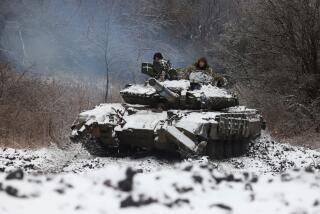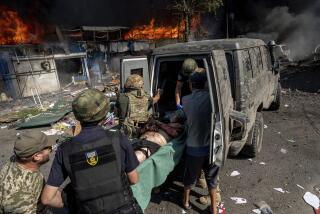Why Fascists Are Smiling: Russia Is a Bosnia Player
- Share via
SCOTTS VALLEY, CA. — Silencing the guns of Sarajevo has been hailed in Washington and the West as a breakthrough achievement in Western efforts to halt the Bosnian carnage. But will it bring this tragic conflict to a close and redeem the West after years of empty threats and appeasement?
The truce in Sarajevo will not guarantee a quick and equitable settlement. Quite the contrary. It is more likely to make it more difficult to achieve one. Also, what has happened in Sarajevo is virtually certain to complicate the already complex interaction of regional and foreign powers and have further negative consequences for U.S. policy and the progress of reform in Russia.
Even a cursory look should show that what has been accomplished so far is no more than the cessation, at least for the time being, of the criminal shelling of Sarajevo’s civilians by the Serbs. While this is not a small matter for traumatized Sarajevo residents, it is hardly a momentous victory for the West. The Serbs appear to be complying with the ultimatum, by and large, but they’re not exactly doing it on NATO’s terms. The North Atlantic Treaty Organization’s stern insistence on placing heavy weapons under its control has been quietly replaced by a vague demand for “monitoring,” and cases of flagrant defiance of the ultimatum by the Serbs have gone unpunished, as so many times in the past.
By far the most serious new development, however, is the sudden emergence of Russia as a decisive player in the conflict, apparently at the urging of the Clinton Administration. There is, of course, nothing wrong per se with getting Russia engaged in resolving international conflicts. Attempts by some in the West to treat Moscow as an irrelevant, defeated power are myopic and fraught with danger. But allowing Russia to play a key role in the Yugoslav conflict, under the auspices of the United Nations, is a serious mistake. Moscow is anything but an impartial player.
The West appears to have swallowed the journalistic shibboleths about a “historical brotherhood” between Russians and Serbs, which somehow entitles the former to intervene on behalf of their “fellow Slavs” and “Orthodox brethren” and have a say in Balkan destinies. Conveniently disregarded in this analysis is that Russia’s policies, as with all great powers, have historically been driven solely by national interests and imperial ambitions rather than altruism or ethnic and religious affinity. For that matter, some of the implacable enemies of the Serbs--the Croats and, indeed, the Bosnians themselves--are also “fellow Slavs,” while other age-old antagonists, like the Bulgarians, are both “fellow Slavs” and “Orthodox brethren.”
Forgotten also is the fact that, for the past 50 years, relations between Serb-dominated Yugoslavia and the Russian-dominated Soviet Union had more often than not been characterized by hostility. It is worth pointing out that throughout most of this period, Serbian officers were trained in U.S. military academies on how to fight the Russians and that the Yugoslav military doctrine of “territorial defense” was predicated on repulsing Soviet aggression.
By implicitly recognizing the region of the Yugoslav conflict as within the sphere of Russian interests, the West has handed Moscow a de facto veto power over its resolution. That it may not be reluctant to use it has already become evident in its opposition to extending the NATO ultimatum to areas other than Sarajevo. Worse still, given the obvious Russian sympathies for the Serb cause, it would not be far-fetched to imagine that the Russians’ current task of “restraining” the Serbs could easily be transformed into one of protecting their territorial gains.
At the very least, Russia’s intervention has broken the international isolation of Serbia and has seemingly given the pariah state a powerful champion. This at a time when the tide of war appeared to be turning against the economically prostrate and increasingly demoralized Serbs. No wonder they loudly rejoiced what we have touted as a great NATO victory.
Less obvious, but no less important, Russian intervention in the Bosnia conflict cannot but negatively affect the chances for a successful democratic transformation in Russia itself. The simple fact is that the same forces that are pushing for unequivocal support of the Serbs are also dyed-in-the-wool opponents of democracy and market economics. And they see chauvinism and the resurrection of latent neo-imperialist and anti-Western sentiments among Russians as their most promising weapon against the democrats.
Their portrayal of Serbia as the innocent victim of Western imperialism and Islam could serve a useful purpose. Nothing will strengthen their cause better than a new political confrontation with the West, especially with America.
Russia’s democrats seem not to detect this danger. Though it is not exactly clear where President Boris N. Yeltsin stands on the Yugoslav war, most democratic reformers have long known that their country cannot afford the burden of empire and foreign interventionism if it is to join the community of prosperous, democratic nations. Thus, they have pushed to curtail subsidies to the former republics, cut military expenditures and maintain friendly relations with the West. Unfortunately, it is their opponents’ thinking that seems to be increasingly telling in Moscow’s behavior, including its foreign affairs.
The final new element in the Bosnian imbroglio is the U.S. role. By claiming leadership and taking credit for NATO’s new-found activism, Washington, which has mostly remained on the sidelines, has assumed a center-stage role and, therefore, some responsibility for the ultimate outcome of current peacemaking efforts. It will get much of the credit if peace prevails. If not, blame will surely follow. If Russia’s support emboldens the Serbs to resist a meaningful compromise, while the Europeans continue their efforts to coerce the Muslims into settling on Serbian terms, the chances of failure and continuation of the bitter struggle are very good indeed.
And thus the chances that the guns of Sarajevo will speak again. When they do, on the receiving end will not only be the long-victimized Bosnians, but also America’s credibility and the cause of Russia’s democratic transformation. For Slobodan Milosevic and his generals in Belgrade and for the reactionaries in Moscow, this is an enticing prospect.
More to Read
Sign up for Essential California
The most important California stories and recommendations in your inbox every morning.
You may occasionally receive promotional content from the Los Angeles Times.










